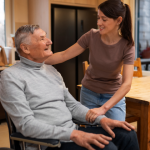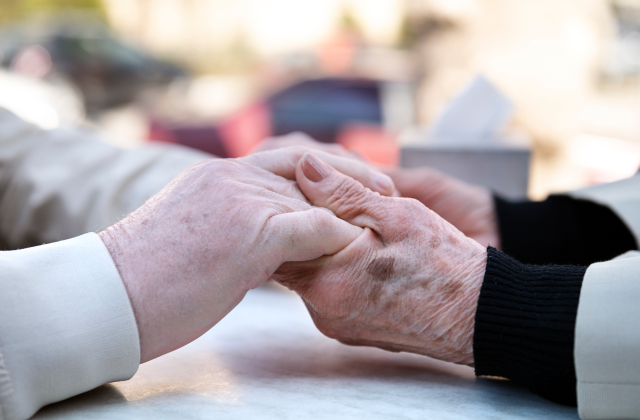Managing Elderly Depression: Home Care Strategies
Depression is a complex and often overlooked mental health issue for older adults that has substantial implications for physical health, quality of life, and emotional wellness. Comprehensive elderly depression care at home requires individualized and multifaceted approaches that are geared toward an integrated intervention of medical care, professional caregiving, psychological care, as well as creating a safe and supportive home environment. In this article we outline the best approaches for how to manage depression in older adults and what home care for elderly mental health can do to help give joy and purpose back to daily life.
Recognizing Depression in the Elderly: Symptoms and Challenges
Depression in seniors often masked as physical symptoms or deterioration of cognitive function can make timely identification of depression difficult. Key indicators of elderly depression include:
- Chronic fatigue and insufficient energy
- Changes in sleep and appetite
- Loss of interest or pleasure in activities that were enjoyed
- Isolation or withdrawal from social interactions
- Hopelessness and sadness
- Identifying early indicators of these symptoms is critical to avoid additional complications as a result of inadequate intervention.

How Home Care is Important to Elderly Mental Health
Elderly mental health home care services provide comfort, safety, and focused engagement that are often elusive in a long-term care setting. The home setting is familiar and promotes emotional balance and lower stress levels as well as a sense of independence.
“Helping seniors suffering from depression in their own homes is an important element of successful treatment and recovery.”—Angel Care Inc. NY
Effective Care and Enabling Therapy Approaches for Elderly Depression
- Medication and Monitoring
The treatment of depression experienced by seniors may mean that they require careful medical supervision and care to support them at home, as well as assessments to ensure they are taking medication in a timely manner and evaluating medication for effectiveness. - Psychological and/or Emotional Support
Elderly emotional support at home must involve the delivery of regular contact, ongoing support in promoting goal directed social and creative activities, and some form of assistance in times of distress. Professional caregivers can help attempt to overcome anxiety and loneliness. - Therapeutic Programs at Home
Caring for seniors with depression at home that may convert into therapy – individualized therapeutic sessions, working with a psychologist or therapist, at home – can also positively contribute to enhancing their emotional resilience, and will help establish coping strategies to deal with negative and unhelpful emotions and thoughts. - Exercise and Routine
Light exercise and walks, and having scheduled daily activities, can improve emotional wellbeing and overall elderly quality of life.
Recognizing Depression and/or Emotional Distress, and When to Seek Support
Family and caregivers should recognize changes in behavior and mood with elderly clients. Early Activation, and subsequent diagnosis and treatment, is necessary for effective depression treatment for seniors.
Tips to consider:
- Monitor for changes in sleep, appetite, and activity
- People slowly withdraw from contacts and stop talking
- Physicians may misdiagnose a serious medical condition so report any symptoms immediately
- Don’t delay getting help
Benefits of Home Care with Angel Care Inc. NY
Angel Care Inc. NY provides continuous comprehensive mental health care for elderly at home services with superior benefits:
- Comprehensive individualized based care plans that consider the psycho-emotional;
- Continuing support services and professional assistance 24/7 knowledge and experience in mental health training;
- Teaching families and caregivers ways to support seniors effectively;
- Coordinating care and treatment with any medical professionals
“At Angel Care Inc. NY our goal is to make every day of a senior’s life a day filled with care, understanding, and support.”—Angel Care Inc. NY.
Conclusions
Caring for elderly persons with depression can be challenging work as there are many complex demands and barriers to overcome to provide the necessary care and support. Elderly at home home care for mental health care and treatment continues to be a supported, reliable solution and provides elderly seniors with quality of life and emotional support to ensure they maintain their improved emotional well-being while being in a familiar location and home. If you or your loved ones are dealing with depression, do not be afraid to ask HHA for help — together we can bring back lightness and joy to every day.

Ensuring safe and effective mobility for seniors is a crucial aspect not only for the elderly themselves but also for their families and home care professionals. As physical limitations and decreased mobility increasingly affect older adults, properly selected mobility aids for elderly can dramatically enhance quality of life, promote independence, and reduce risks of falls and injuries. This article explores how to make the best choices when choosing the right mobility aid for seniors, reviews various senior home care mobility products, and highlights key factors to consider when selecting mobility devices. Why Choosing the Right Mobility Aid Matters For many seniors, transitioning to using mobility assistance is not only a matter of safety but also one of preserving dignity and autonomy. Improperly fitted or unsuitable mobility devices for elderly at home may worsen balance issues, cause pain, or contribute to emotional distress. “Choosing the right mobility aid is an investment in a senior’s quality of life and confidence in their own abilities.” — HHA Angel Care Inc. NY Main Types of Mobility Aids for Seniors 1. Canes The most common and simple support tool. Canes vary in design—from single-point models to quad canes with four legs for greater stability, and folding versions for easy transport. Advantages: Lightweight and compact Support for mild balance impairments Affordable What to consider when choosing a cane: Height should match the senior’s stature to avoid strain Comfortable, non-slip handle Materials such as lightweight aluminum or wood 2. Walkers Designed for those with more significant balance or strength limitations. Walkers have four legs and may include wheels for easier movement. Types of walkers: Standard (stationary) Rolling walkers (rollators) Walkers with built-in seats for rest Benefits: Maximum stability Weight redistribution support Prolonged independence 3. Wheelchairs Used when walking is impossible or highly restricted due to severe mobility loss. Types: Manual wheelchairs Electric wheelchairs Seats, wheels, and controls should be customized to the individual’s needs. Key Factors When Choosing a Mobility Aid Selecting the best device requires a comprehensive assessment of physical condition, lifestyle, living environment, and emotional comfort. Physical Health and Ability Muscle strength and endurance Balance and coordination Chronic conditions (arthritis, osteoporosis) Ability to safely sit and stand Home Environment Size and layout of rooms Presence of stairs and thresholds Flooring type (carpet, tile, wood) Psychological Comfort and Habits Willingness and motivation to use the aid Level of desired activity and mobility Fear of falling and related barriers Device Type Model Features Quad Cane Hugo Quad Cane Maximum stability, foldable design Standard Walker Drive Medical Deluxe Walker Durable frame, adjustable height Rollator Walker Medline Rollator Ideal for longer walks, equipped with brakes Manual Wheelchair Invacare Tracer SX5 Lightweight and maneuverable Electric Wheelchair Pride Mobility Jazzy Air 2 Advanced lift and comfort features Adaptive Devices to Enhance Senior Mobility In addition to primary mobility aids, various adaptive devices for elderly mobility increase safety and ease: Grab bars and handrails (bathroom, stairs) Lifting aids and footrests Non-slip mats Shower and toilet seats Tips for Proper Use and Maintenance Regularly inspect wheels and rubber tips for wear Keep mechanical parts clean and lubricated if applicable Store devices in dry environments Consult health professionals upon any change in mobility Educate users on correct walking techniques with the aid Why Choose Angel Care Inc. NY for Mobility Aid Support? Angel Care Inc. NY offers expert home care and guidance in selecting mobility aids for elderly, providing not only technical assistance but also emotional support tailored to each client’s unique needs. Our caregivers help customize devices, teach their proper use, and ensure a safe home environment. “Supporting mobility is key to preserving independence and dignity for our senior clients.” — Angel Care Inc. NY Conclusion Choosing the right mobility aid for a senior is a multidimensional process involving physical assessment, living conditions, and emotional readiness. Modern senior home care mobility products empower older adults to stay active and safe. Contact Angel Care Inc. NY for personalized consultation and compassionate support every step of the way.

Caring for a loved one is a heartfelt demonstration of love and commitment. However, this noble endeavor often brings about significant physical and emotional challenges. If these challenges remain unaddressed, they can lead to complete exhaustion. Preventing caregiver burnout is not merely a suggestion — it is a vital step in maintaining emotional stability and ensuring the highest quality of care. In this article, we will delve into practical and insightful strategies for caregiver stress management, highlight key warning signs, and provide effective tools to restore balance in your life. Understanding Caregiver Burnout: What It Is and Why It Matters Caregiver burnout is characterized by a state of physical, mental, and emotional fatigue that arises from prolonged stress and insufficient respite. Family caregivers, in particular, are at risk, often neglecting their own needs in favor of others. Common signs of caregiver burnout include: Persistent fatigue, even after adequate rest Increased irritability, frequent crying, or feelings of guilt A noticeable decline in motivation or interest in previously enjoyable activities Physical symptoms like headaches, muscle tension, and disruptions in sleep Feelings of isolation and loneliness, even when surrounded by others "Burnout is not a weakness — it’s your body and mind’s way of saying you’ve cared for others while forgetting yourself." — Angel Care Inc. NY The Consequences of Ignoring Caregiver Stress Understanding caregiver health and wellness tips is crucial not only for your own well-being but also for the health of those you care for. When caregivers become overwhelmed and emotionally drained, the risks of mistakes increase, relationships can suffer, and the quality of care provided may decline. If left unchecked, caregiver stress can lead to: Worsening of chronic health conditions Heightened risk of depression and anxiety Decreased attention and compassion in caregiving A pervasive sense of failure or a desire to give up Practical Tips to Avoid Caregiver Burnout Implementing caregiver self-care strategies is essential for sustaining your well-being. Here are some effective recommendations to help you navigate the challenges of caregiving: Set Clear Boundaries: Learn to say “no” when necessary. Acknowledge that you cannot do everything, and that’s perfectly acceptable. Delegate Responsibilities: Seek help from friends or family. Even a brief respite can lead to significant rejuvenation. Take Scheduled Breaks: Allocate 15–30 minutes daily for silence and rest to reset your mind and spirit. Prioritize Physical Health: Focus on: Getting 7–8 hours of sleep per night Consuming balanced meals Engaging in light exercise, such as yoga or walking Maintain Social Connections: Participate in support groups or connect with friends for emotional support, which is crucial for stressed caregivers. Practice Mindfulness: Incorporate breathing exercises, journaling, and meditation into your routine to alleviate mental overload. Managing Caregiver Mental Health: Building Emotional Resilience To effectively manage caregiver mental health, cultivate emotional awareness and engage in personal reflection. Consider the following: Let go of guilt associated with feelings of frustration. Discuss your experiences openly with a therapist, friend, or support group. Accept your limitations and recognize that perfection is not a requirement. Carve out time for joy through movies, books, hobbies, or simply enjoying a quiet cup of tea. "The best thing you can do for your loved one is not to lose yourself in the process of caring for them." — Angel Care Inc. NY Support Systems for Family Caregivers Remember, you do not have to face caregiving challenges alone. Angel Care Inc. NY offers: Individual consultations for personalized home care planning Access to qualified home care professionals Educational resources aimed at preventing family caregiver exhaustion Respite care services to ensure you can rest and recharge Caregiver Wellness Plan: Build Your Personal Balance Strategy Create your own caregiver wellness roadmap: Wellness Area Actions to Take Emotional health Talk, journal, connect with a therapist Physical well-being Sleep, eat well, stay active Social engagement Stay in touch with friends, join a group External support Use Angel Care services, ask for help You Matter Too Preventing burnout is the key to sustainable caregiving, personal fulfillment, and self-respect. As emphasized by Angel Care Inc. NY, caring for yourself is integral to providing excellent care for those you love. "Compassionate caregiving begins with compassion for the caregiver." If you find yourself feeling overwhelmed or nearing your emotional limits, remember — you are not alone. Reach out to Angel Care Inc. NY for the support you need, enabling you to continue offering care to those who matter most to you.



